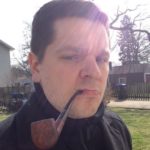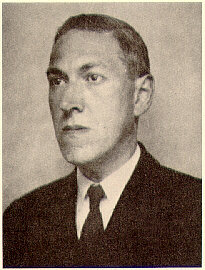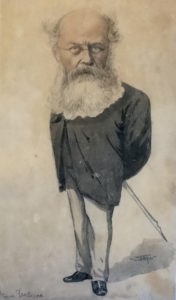Today I have the privilege of interviewing one of my favorite indie authors, Ben Willoughby. We first ran across each other on Twitter, and since then I’ve gotten to know him and his writing. So without further ado, let’s chat with Ben.
CW: Tell us a little about yourself.
BW: First, thank you for inviting me to partake in this interview! I’m flattered to have the honor of talking on your blog!
CW: You’re welcome.
BW: My name is Ben Willoughby, and I’m a happily married husband with a beautiful wife and a lovely daughter who turned three last October. I’m an indie writer who’s mainly dabbled in fantasy as well as horror. I have a dieselpunk trilogy I’m currently working on. In my full-time job, I’m a graphic designer.
CW: You’re a bit like me. Writing in several different genres. What did you read as a child?
BW: I really got into mysteries and science fiction as a kid.
For mysteries, I ate up every single Sherlock Holmes book Sir Arthur Conan Doyle wrote, as well as many of Agatha Christie’s Poirot books.
For science fiction, I read a lot of HG Wells, Arthur C. Clarke, Jules Verne, and AE Van Vogt.
When I first started writing for fun at thirteen, I tried to come up with my own mysteries, but could never really finish them. Some have said you should write what you enjoy, but I’ve found I can rarely figure out how to do a straight up detective novel.
I also read heavily into military history. My dad was an officer in the army (he’s since retired), so I grew up with a lot of his old books laying around the house, and was exposed to them. By middle school I had a better knowledge on events like the Napoleonic Wars or World War II than most kids my age.
While my family was stationed in Europe in the mid-90’s, I would go to school and read Erwin Rommel’s World War I memoir Infantry Attacks, and I got to go to the Waterloo battlefield for my thirteenth birthday. I could never get into historical fiction – I think the only historical fiction book I read was The Killer Angels, which was later turned into the movie Gettysburg.
CW: Very interesting. Similar interests, you and I. Aside from writing, how do you spend your free time?
BW: I do artwork, whether it’s sketching or graphic design. My main full-time work for the past decade has been in graphic design, as well as motion design and editing. This has helped me in my writing, since I’ve been able to design my own covers. With the exception of Gods on the Mountain, where I used a freelance artist to paint the cover for me.
I also do a lot of personal study on various topics. My favorite subjects are military history and theology.
And of course, when my daughter is awake, and is in the same room as me, she always desires daddy time.
CW: Yes, there is always the requisite “daddy time”.
BW: There is.
CW: Being a writer, you’re also a reader I would guess.
BW: Yes.
CW: How many fiction books do you read a year?
BW: I read quite a bit, though I don’t know if I can really pin a number on it. If I had to “guesstimate,” I would say about two dozen a year. Part of the problem is finding the time to sit down and read – I’ll get involved in another project, or have to spend time with the family, and by the time I’ve sat down in a place where I can read, I’m too tired to mentally focus. I’ve been getting better about it recently, however.
I also read quite a bit of non-fiction on top of fiction. I recently read a book on what life in England was like at the turn of the first millennium, and am now going through a book on Martin Luther.
CW: What book do you think everyone should read and why?
BW: This is a hard question to answer, because obviously not every book is going to be for every person’s taste. Any book I say, there will most likely be someone out there to say it’s not for them, or could never, in any way, edify them.
CW: Fair enough, so tell us instead about a book that has influenced you as a person.
BW: I used to have an enormous, single volume of Matthew Henry’s commentary on the Bible.
CW: Hey, I had one of those! A great Puritan commentary.
BW: Yes, it is. His analytical way of thinking, and explaining everything as if he were writing a sermon, influenced how I read things in general, which was carefully, word for word, and with a larger picture in mind. It did way more to assist my understanding of comprehensive reading than any test I took in school did.
CW: Spot on about Matthew Henry. Okay, you are being exiled to a small island in the Pacific. You can take 3 books with you. What books would you take and why?
BW: a. The Bible, to maintain my faith and knowledge in true wisdom.
b. The Encyclopedia of Military History by the Dupuys. I used to read that for fun as a kid. There’s enough information in there to pass away eternity and a day.
c. Starship Troopers by Robert Heinlein, because that’s good sci-fi. (Also, fudge the movie.)
CW: Very interesting choices. So now tell us about a book that’s influenced you as a writer.
BW: It’s hard to pin this down exactly on any one book, because obviously we glean from everything we read, and there are plenty of authors out there who have influenced us. If I had to point to one (in a collective sense), it might be George R.R. Martin’s A Song of Ice and Fire series.
The earliest books did a great job not only in character development, and every character feels different in their motivations and desires, but the worldbuilding was also excellent. Westeros felt like a real, functioning world. I won’t say his worldbuilding is perfect, as there are a few parts I find a tad bit contrived (eg., one house ruling the same position for thousands upon thousands upon thousands of years), but compared to other works, it’s much more polished. To step into the story is to step into another land.
It’s a bit sad for me to say all this, and I hesitated doing so, since I’ve stopped reading the series long ago. George R.R. Martin takes decades to write one book (confirming my earliest fears that he was the new Robert Jordan), and his storyline has gotten bogged down in so many subplots he’s now admitted he’ll have to write several more books. Also, it’s quite obvious he’s sold out to HBO. But that’s another rant for another time.
CW: Of all your books, which one is your favorite and why?
BW: I find myself still going back to my novelette The House That Homed. It was a lot of fun to write (about three-quarters of it was complete, on-the-spot improvisation) and it showcases my sense of humor, which admittedly is pretty unique and relies heavily on non sequitur. Whenever I pick it up and reread it, there are scenes (like Officer Bruce’s meltdown) that still make me crack up. There are also some parts that will reenter my head as I’m out and about and make me chuckle (like the “It’s the Kickstart guys again” line).
CW: Oh, yes, The House That Homed is fabulous. Superb dark humor. Now, if I hadn’t read any of your books, which one should I start with and why?
BW: In all honesty, probably one of the last ones I published, Mannegishi. I think it’s the much more polished of much of my work, in terms of development, story, and build-up. I was also pretty proud of how I developed each of the individual characters, and how they relate. This was the book where, at a pinnacle point in the romance subplot, my wife actually lamented, “I don’t even care about the aliens anymore!” It was also a lot of fun to write scenes involving exchanges between certain characters, such as the scene where Rick and Lucy have some brief convos, or all the scenes where Sam and Rick go at each other, and so I feel like those scenes really work.
CW: I haven’t read Mannegishi yet. It is, however, on my list. Thank you, Ben Willoughby, for chatting with us today.
And now here is a bit more about Ben, where you can find his books, and get in touch with him.
 Ben Willoughby was born in the United States and, being a military brat, ended up seeing a lot of it (along with a foreign country or two). At a very young age, he found a love for reading. At the age of 12, he found a passion for writing. In his late 20’s, he decided to pursue publishing many of the ideas and concepts he had developed over the years. He currently lives in Ohio with his loving wife and young daughter. When not writing or reading, he spends his spare time sketching and smoking his pipe.
Ben Willoughby was born in the United States and, being a military brat, ended up seeing a lot of it (along with a foreign country or two). At a very young age, he found a love for reading. At the age of 12, he found a passion for writing. In his late 20’s, he decided to pursue publishing many of the ideas and concepts he had developed over the years. He currently lives in Ohio with his loving wife and young daughter. When not writing or reading, he spends his spare time sketching and smoking his pipe.
You can find Ben’s books at:
https://www.amazon.com/Ben-Willoughby/e/B00WV2OQI2
Ben’s website is: http://benwilloughbyauthor.blogspot.com/
And you can find him on Twitter (https://twitter.com/BenWilloughby84)
and Goodreads (https://www.goodreads.com/author/show/13877156.Ben_Willoughby)
Share This!




